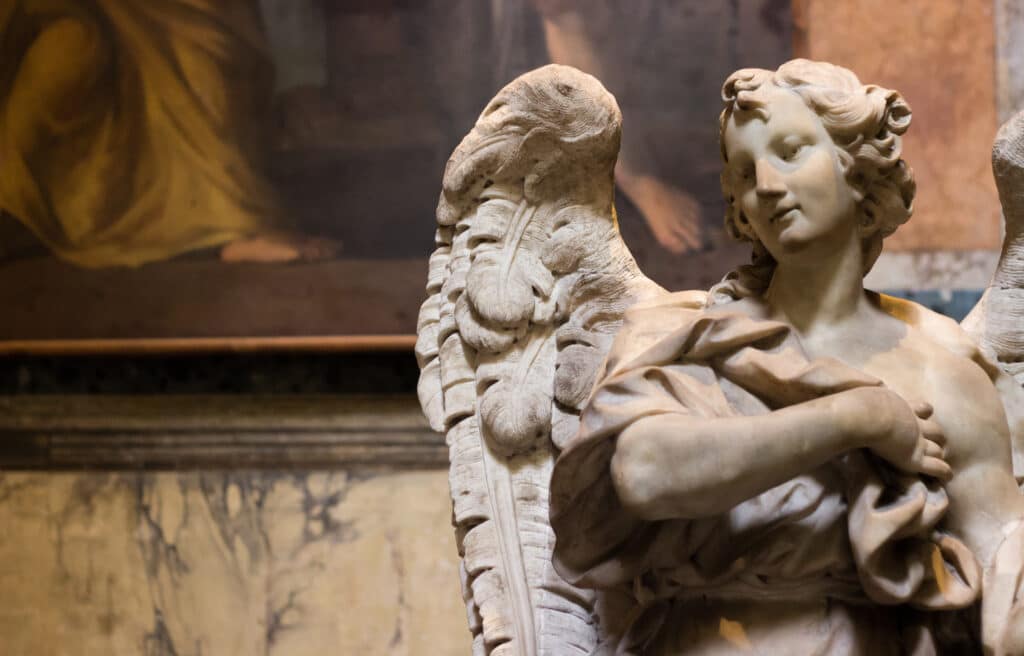Angels in the Bible
You are about to discover Hebrew words for angels, angels in the Bible, cherubim, seraphim and the like. Let’s take a moment and think.
What do we typically think of when we think of angels? I hope it’s not just chubby, winged babies commonly depicted in Renaissance art and iconography. Or a little cupid on a Valentine’s Day card… Maybe we picture life after death, with winged men and women playing the harp in the clouds.
Some people will think of Clarence, the angel who showed George Bailey what his life would be like without him in the Christmas classic, It’s a Wonderful Life. The 90’s TV series “Touched by an Angel” also showed angels looking like regular men and women, sent to help people in trials.
Often, when our friends and family support us in a time of need, or when we receive kindness from a stranger just in a nick of time, we call them “angels”. That is because their kindnesses felt like a touch from heaven.
Biblical Descriptions of Angels
But make no mistake about it, the Bible has detailed descriptions of who angels are, as well as what they are not. So, maybe we should start with some basic facts.
What are Angels according to the Bible?
Angels are spiritual beings, who have supernatural abilities and gifts. But angels are not divine beings, that we should worship or pray to. Angels are not omnipresent and cannot be in multiple places at once as God can.
Angels are also not eternal beings, as they are created by God, thus have a beginning. Although they have immortality, their lives are contingent upon God’s authority and exist within a determined boundary by God (Luke 20:36).
We know that angels are ethereal, not of this world, but they are not perfect. Scripture clearly indicates that angels are fallible. They can love, hate, have free will and they can rebel against God – as God’s greatest enemy did.
In Genesis 6:1, scripture describes angelic beings (“sons of God”) taking human wives. This was displeasing to God and the rest of the passage describes judgement upon the earth (Job 4:17-18; Genesis 6:1).
Biblical Examples of Angels
How are angels described in the Bible? Angels don’t have wings and angels are not female… But they aren’t necessarily male either! Nevertheless, Scripture tells us that when they take on human form, they take on the male form. The angel guests that Abraham greets in Genesis 18 appeared to him as three men (Genesis 18:1).
The angels that visit Lot in Sodom and Gomorrah also appeared as two men. Additionally, they were so attractive that they drew the attention of the townspeople. Which made it even more expedient to finish their assignment to destroy the wicked city.
In Genesis 32, the angel who wrestles with Jacob appears as a man. And when Shadrach, Meshach and Abed-Nego are in the furnace, King Nebuchadnezzar sees a fourth man, who appears like “a son of the gods” (Daniel 3:24-25).
So now that we know some basic facts what angels are and are not, let’s get to it.
Hebrew and Greek Words for Angels
The English word “angel” comes from the Greek word angelos which means “to send”. The corresponding Hebrew word is malach (malachim in the plural) which means messenger. In both cases it is a “job description” rather than a description of their essence or nature.
Being that it is more like a job description, there is also a hierarchy to them and to what they do. And unsurprisingly, there are multiple Hebrew words for angels that are worth knowing.
The Role of Angels in the Bible
A so-to-say regular messenger angel (malach/angelos) is distinct from the seraphim and cherubim and archangels.
Messengers are sent into the world to bring divine messages, as well as bring back messages to God. In their passing on of messages, there is often a ministerial role. The information conveyed, if favorable, is often meant to encourage and strengthen in times of perplexity and trouble.
An angel announced Jesus’ birth to the shepherds and a host of angels sang praises (Luke 2:9-14). Jesus is ministered to by angels when He is tempted by Satan in the wilderness (Matthew 4:11). And an angel leads Peter out of a prison (Acts 12:6-11).
Archangels: Unique Angels in the Bible
Archangels are like messenger angels, but their role is a bit more distinct and personal. The Greek name archangel stands for “chief angel”, which puts them at the top of the angelic hierarchy.
The Protestant Bible labels only one angel to be in the chief position – that is Michael (Daniel 10:13), whose name means “who is like God”. However, many also recognize Gabriel to be an archangel (whose name means “God is my power”), even though the Bible does not address him with that title.
We know that Lucifer also held a high position among angels, before his rebellion, causing many to call him the third archangel (albeit fallen) of the original three. Nevertheless, we do not know for certain how many archangels there are, since the Bible doesn’t directly specify that. It is actually likely that there are more than two or three.
Hebrew Angel Names: Gabriel
The Angel Gabriel’s role is to interpret dreams and bring significant revelations. It is Gabriel who foretold to Zechariah the birth of his son, John (Luke 1:19). And he also appeared to Mary, to announce the birth of Jesus (Luke 1:26).
Because Mary was perplexed by this news, Gabriel ministered to her and explained in more detail the coming events, assuring her of finding favor with God. He then also meets with Joseph, so he doesn’t abandon Mary.
In Daniel 10, we read about Gabriel appearing to Daniel in a vision. He came to answer Daniel’s prayer and gives him a vision of the future. Yet Gabriel was delayed in delivering his message, because he was deterred by the Prince of Persia – not a human ruler, but a spiritual principality.
Hebrew Angel Names: Michael
Michael the archangel was the only one capable of helping Gabriel in his assignment to bring the message to Daniel (Daniel 10:21). So doesn’t Michael send messages too? Well, not exactly. From Biblical texts we can conclude that Michael is a warring angel, the great captain of the heavenly host. (You may remember our Hebrew word study of the names of God, one of which is “Adonai Tzevaot” – the Lord of angelic armies.)
Michael fought the Prince of Persia (a malevolent spiritual entity), so that Gabriel could deliver the message to Daniel. We are told that Michael was also specifically assigned to Israel, to protect Israel (Daniel 12:1). He will still play a significant role in end time events, according to the Bible.
It is possible that the Apostle Paul references Michael in Thessalonians 4:16, who heralds in the second coming of Christ. In Revelation 12, it is Michael and his angels who war with the dragon and his demons, and eventually cast them down to earth (Revelation 12:7-9).
Are the Cherubim and Seraphim also Hebrew Words for Angels?
Unlike the messenger angels and archangels, cherubim and seraphim do not have human likeness at all. In fact, they are creature-like, hard to imagine, although some prophets saw them with their eyes. These heavenly beings surround the throne room of God and praise Him unceasingly.
We’ll start with the cherubim, which are described in detail in Ezekiel 1 and Revelation 4. Although so many today associate cherubim with cute, chubby babies with wings, they are nothing of the sort!
Cherubim
Cherubim are mysterious winged creatures who have four wings and four faces. They surround the throne of God and praise Him continually. Revelation 4:5-8 gives us an abbreviated, but powerful and clear description:
Out from the throne come flashes of lightning and sounds and peals of thunder. And there were seven lamps of fire burning before the throne, which are the seven Spirits of God; and before the throne there was something like a sea of glass, like crystal; and in the center and around the throne, four living creatures full of eyes in front and behind.
The first creature was like a lion, and the second creature like a calf, and the third creature had a face like that of a man, and the fourth creature was like a flying eagle. And the four living creatures, each one of them having six wings, are full of eyes around and within; and day and night they do not cease to say,
“HOLY, HOLY, HOLY is THE LORD GOD, THE ALMIGHTY, WHO WAS AND WHO IS AND WHO IS TO COME.”
And let’s not forget that Cherubim were the ones guarding the entrance to the garden of Eden, and were depicted on the ark of the covenant.
Seraphim
Seraphim, like cherubim, are associated with the presence of God, but unlike the cherubim who are under the throne of God (Psalm 99:1), seraphim are directly in God’s presence.
Seraphim are angelic beings who may have resembled snakes with wings (seraph can mean a snake as a noun, and “to burn” as a verb), surround the throne and continually cry out “Holy, Holy, Holy”. The Prophet Isaiah saw a vision of seraphim surrounding the throne and was commissioned by a seraph who touched his lips with a burning coal (Isaiah 6:6-7).
“In the year of King Uzziah’s death I saw the Lord sitting on a throne, lofty and exalted, with the train of His robe filling the temple. Seraphim stood above Him, each having six wings: with two he covered his face, and with two he covered his feet, and with two he flew.
And one called out to another and said, “Holy, Holy, Holy, is the LORD of hosts, the whole earth is full of His glory.” (Isaiah 6:1-3)
If you are familiar with Jewish liturgy, you may recall tilting yourself upwards on your toes when you recite this passage of Isaiah, upon the words “kadosh” (holy). According to a Rabbinic tradition, doing this is imitating the seraphim.
The Angel of YHVH in the Bible
The Bible introduced yet another supernatural being in several books that is a little difficult to define. He is most often called the Angel or the Messenger of the Lord (YHVH). Although some treat him as merely God’s representative, there are unique characteristics that make one wonder why he is described differently.
According to many scholars, the figure is actually God Himself in the visible form of a man. Consider the story of Joshua, to whom appears the Commander of God’s army:
When Joshua was by Jericho, he lifted up his eyes and looked, and behold, a man was standing before him with his drawn sword in his hand. And Joshua went to him and said to him, “Are you for us, or for our adversaries?” And he said, “No; but I am the commander of the army of the Lord. Now I have come.”
And Joshua fell on his face to the earth and worshiped and said to him, “What does my lord say to his servant?” And the commander of the Lord army said to Joshua, “Take off your sandals from your feet, for the place where you are standing is holy.” And Joshua did so. (Josh 5:13–15)
The first striking difference between this Commander and other angels is their reaction to expressions of honor. Usually, when a person bows to any angel, they protest, asking the man or woman to stand up and not be afraid.
But the Commander of God’s army not only allows Joshua to bow. He even instructs him to take his sandals off! Does that remind you of any other story? Could it be parallel to the story of Moses and the burning bush? (Ex 3:2; Acts 7:30–31)
Angels and Mankind According to the Hebrew Bible
So far, we have learned that some angels resemble humans, and others do not. Some send messages, visions, or encouragement, and others are tasked with more significant announcements or military assignments. So, what does this mean for us today?
Scripture discourages from worshipping angels or praying to them (Matthew 4:10; Colossians 2:18). In a sense, they are our peers for we are just “a little lower” in God’s hierarchy of creation (Psalm 8:5).
But Scripture also reminds us that angels are an integral part of creation and that sometimes our human lives and actions align with theirs. Especially when we give our whole hearts to God and are living with a full heart of faith and devotion.
Pastor Adam Smallcombe of Vive Church puts it this way: “Human activity and angel activity converges when there is an aligned purpose between heaven and earth.”
Who are Angels to Us, Humans?
We can be encouraged that in addition to the Father, the Son and the Holy Spirit watching over us, God also directs angels to protect, guide and minister to us (Psalm 91:11-12), as His discretion sees fit.
What is more, the Bible says that in living our lives of faith, loving the Lord with all our heart, and loving our neighbor and the stranger, we may find ourselves entertaining angels without even knowing it (Hebrews 13:1-2). So there’s even mention of Angels in Hebrews!
Finally, we have the blessed assurance that upon death angels will escort our souls to Heaven (Luke 16:19-31). There, we will rejoice with them and praise God continually.

7 Hebrew Words Every Christian Should Know: Free PDF Download
With the use of the Hebrew language God revealed Himself to mankind. This ancient tongue held the greatest spiritual truths that guided our lives through the ages. And in each generation, they are discovered anew.
We know the Bible can be hard to understand and you want to get more out of it. Which is why we want to teach you seven Hebrew words that will transform the way you read the Bible.
Articles Related to the Hebrew Word for Angels
Estimated reading time: 10 minutes
Bibliography
The Bible Project. 2019. “Angels and Cherubim.” YouTube. https://www.youtube.com/watch?v=-bMRxQbLUlg.
Britannica, T. Editors of Encyclopaedia. “Gabriel.” Encyclopedia Britannica, June 3, 2021. https://www.britannica.com/topic/Gabriel-archangel.
Britannica, T. Editors of Encyclopaedia. “Michael.” Encyclopedia Britannica, June 23, 2022. https://www.britannica.com/topic/Michael-archangel.
Heiser, Michael. “Seraphim and Cherubim.” YouTube. Naked Bible , July 26, 2017. Accessed August 3, 2022.
Smallcombe, Adam. 2022. Review of Angels: Where the Hell Is Heaven? Sermon. July 17. https://www.youtube.com/watch?v=B_4iPJNes3w.



